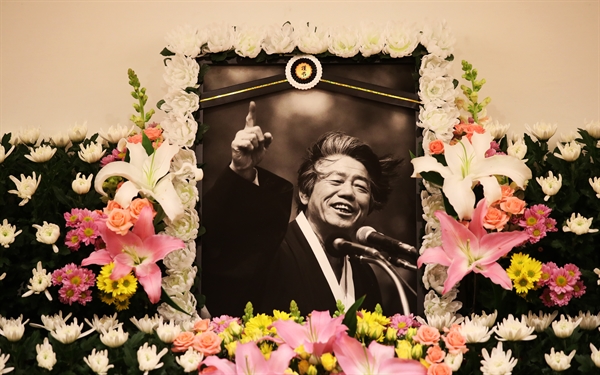|
View larger picture |
|
| ▲ On the morning of the 15th, the late Baek Ki-wan, director of the Institute for Unification Studies, is prepared at the funeral hall of Seoul National University Hospital in Jongno-gu, Seoul. | |
| Ⓒ Joint coverage photo |
See related photos |
Baek Ki-wan, who has devoted his life to the anti-dictatorship democratization, people, and reunification movement, passed away on the 15th, and a commemorative incense center for Busan citizens will be established in Busan Democratic Park and Busan City Hall Square.
Busan Democratic Park announced on the 15th that “Senior Baek Ki-wan, a big adult of the democratization movement, passed away at the age of 89. We will operate an incense burner on the first floor of the Democratic Uprising Memorial Hall until the 18th.”
Civil society organizations in Busan also plan to install incense burners in the Busan City Hall Square. The Busan Movement Headquarters for the Great Reform of the Redemption Clearing Society, consisting of 70 organizations in the Busan region, will start operating the incense from the afternoon of the 16th after discussion on the day.
In a conversation with Jeon Jeon-bong, head of the Busan Movement Headquarters, he said, “I want to share my heart of commemoration for Mr. Ki-wan Baek, a friend of workers, reunification, and the poor, with the citizens as well as the citizens of Busan. We will set up an incense in the open plaza.”
The KCTU Busan headquarters is also preparing an incense burner at the Labor Welfare Center, so the number of incense centers in memory of Paik Ki-wan in Busan is expected to increase.
Baek Ki-wan, who was a fighter of the streets, went on duty at 4 am on this day. The mortuary was prepared at the funeral hall of Seoul National University Hospital, and the decree was at 7 am on the 19th. Several political parties and civil society established funeral committees through emergency meetings of representatives.
Born on February 29, 1932 in Eunyul, Hwanghae-do, Paik Gi-wan devoted everything to the change of our society until this day before the beginning of the year. Although he passed the pitfalls of dying several times as torture of the military dictatorship, until recently, he led Byeong-hwan’s body to the streets and spoke out. After the peasants and poor movements in the 1950s, he started the ‘movement against the Korea-Japan agreement’ in the 1960s and 1970s, and ‘opposed to the three-line amendment, the movement to abolish the renewal of the constitution’. did.
In the presidential elections in 1987 and 1992, after the June uprising, Paik Ki-wan ran as a candidate for the people and devoted himself to the political power of the progressive camp. I also visited Busan several times. Baek Ki-wan, who got on the Hope Bus to stop Hanjin Heavy Industries’ layoffs in 2011, also tried to solve the labor problem. The last post I left in my life was “Kim Jin-suk,” which urged the reinstatement of the leader of the Busan Headquarters of the Democratic Trade Union, a 35-year layoff.
Baek Ki-wan also published several novels and essays while carrying out campaigns using pure Korean words such as’Club’,’Newbie’,’Mokoji’ and’Daldongne’. ‘Moonbinari’, which he wrote, became the lyrics of’The March for Being’, a memorial song for the May 18 Uprising.

